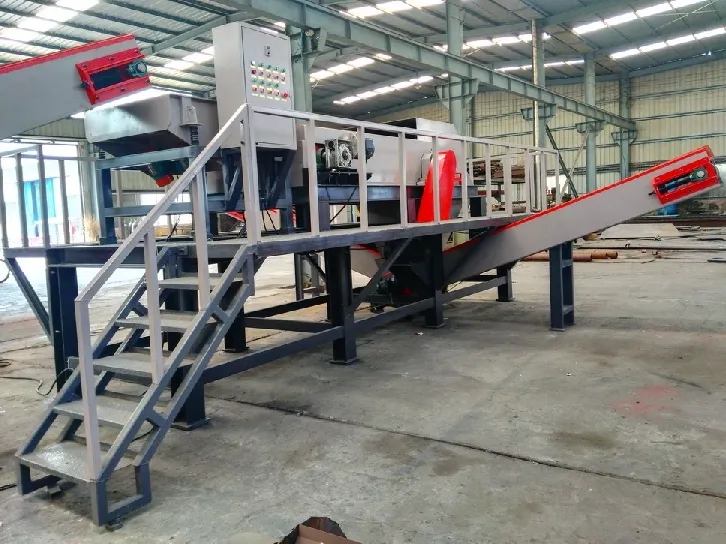

дек. . 10, 2024 00:00 Back to list
The Importance of Aluminum Can Recycling Plants
In the contemporary world, where environmental sustainability has become a critical issue, aluminum can recycling plants play a pivotal role in reducing waste and conserving natural resources. As the demand for aluminum products continues to rise, the need for effective recycling solutions is more pronounced than ever. This article delves into the significance of aluminum can recycling plants, their operational processes, environmental benefits, and the economic advantages they offer.
The Recycling Process
Aluminum can recycling plants operate through a systematic process designed to efficiently convert used cans into reusable aluminum. Initially, the process begins with the collection of aluminum cans from various sources, including households, businesses, and retail outlets. These cans are then transported to the recycling facilities, where they are sorted to remove contaminants such as plastic and glass.
Once the sorting process is complete, the aluminum cans are crushed and shredded. This is followed by a melting phase, where the shredded aluminum is heated at high temperatures until it liquefies. This molten aluminum can be cast into ingots, which are then cooled and solidified. These ingots serve as the raw material for manufacturing new aluminum products, thus closing the recycling loop.
Environmental Benefits
The environmental impacts of aluminum can recycling are profound. Producing aluminum from raw materials involves significant energy consumption and environmental degradation. In contrast, recycling aluminum requires only about 5% of the energy needed to create new aluminum from bauxite ore. Consequently, recycling aluminum can lead to substantial reductions in greenhouse gas emissions.
Moreover, recycling aluminum helps conserve natural resources. For every ton of aluminum recycled, approximately 4 tons of bauxite ore are saved, along with 2 tons of carbon dioxide emissions. Additionally, recycling decreases the demand for landfills, as aluminum cans make up a significant portion of waste in these sites. By diverting these cans from landfills, recycling facilities contribute to a more sustainable waste management system.

Economic Advantages
Aluminum can recycling plants not only provide environmental benefits but also offer significant economic advantages. The recycling industry generates jobs throughout its entire supply chain, from collection to processing and distribution. According to industry reports, hundreds of thousands of jobs are supported by the aluminum recycling sector in the United States alone.
Furthermore, recycling aluminum fosters a circular economy by creating a market for recycled materials. The demand for recycled aluminum continues to grow as manufacturers seek cost-effective and sustainable materials. Since recycled aluminum retains its quality, it can be used to produce high-end products, thereby increasing its market value.
Additionally, recycling can reduce production costs for manufacturers. By using recycled aluminum, companies can lower their energy expenses and raw material costs, thus improving their overall profitability. This creates a win-win situation, as both the economy and environment benefit from aluminum can recycling.
Community Engagement
Aluminum can recycling plants also promote community engagement and environmental awareness. Many facilities conduct educational programs to inform the public about the importance of recycling and how it contributes to a healthier planet. By encouraging local communities to participate in recycling initiatives, these plants help foster a culture of sustainability, leading to increased recycling rates and reduced waste.
Conclusion
In conclusion, aluminum can recycling plants are essential components of a sustainable future. They not only facilitate the efficient recycling of valuable materials but also play a significant role in conserving natural resources, reducing energy consumption, and minimizing environmental pollution. The economic benefits, coupled with community engagement initiatives, further underscore the importance of these facilities in the larger context of environmental conservation and economic sustainability. As global awareness of environmental issues grows, the role of aluminum can recycling plants will undoubtedly become more critical in the quest for a greener, more sustainable planet.
Latest news
Troubleshooting Common Eddy Separator Problems
NewsJul.04,2025
The Role of Metal Recycling Plants in Circular Economy
NewsJul.04,2025
The Impact of Recycling Line Pickers on Waste Management Costs
NewsJul.04,2025
Safety Features Every Metal Shredder Should Have
NewsJul.04,2025
How Industrial Shredders Improve Waste Management Systems
NewsJul.04,2025
How Cable Granulators Contribute to Sustainable Recycling
NewsJul.04,2025